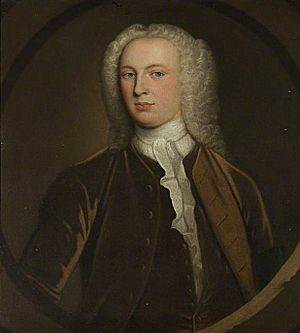John Wall (physician) facts for kids
John Wall (born 1708 – died 1776) was an important English doctor. He helped create two famous places in Worcester: the Worcester Royal Infirmary (a hospital) and the Royal Worcester porcelain factory. He also played a big part in making Malvern a popular spa town, where people went to drink special water for their health.
Contents
Early Life and Education
John Wall was born in 1708 in a place called Powick, in Worcestershire. His father was a tradesman in Worcester city. John went to the King's School, Worcester. Later, he studied at Worcester College, Oxford and then Merton College. He earned his medical degree (M.D.) in 1759.
A Busy Doctor in Worcester
After finishing his studies, John Wall started working as a doctor in Worcester in 1736. He married Catherine Sandys and settled in a large house. He became a very successful and well-known doctor, building a huge private practice. This made him quite wealthy.
Founding the Worcester Infirmary
John Wall was one of the people who helped start a special hospital called the Worcester Infirmary in 1745. It was a charitable hospital, meaning it helped people who couldn't afford medical care. By 1751, this hospital became famous for treating illnesses like scarlet fever and Diphtheria. In 1771, the hospital moved to a new building.
Developing Malvern as a Spa Town
Dr. Wall also worked to make nearby Malvern a popular place for health and relaxation. People believed the water from the wells there had healing powers. He worked with a local chemist, William Davies, to study the water from places like St. Ann's Well and the Holy Well.
In 1756, they published a small book about their findings called "Experiments and observations on the Malvern Water." It turned out the water didn't have many minerals. This made one funny person write:
The Malvern water, says Doctor John Wall,
Is famed for containing just nothing at all.
Even so, Dr. Wall helped improve places for visitors in Malvern. He even arranged for the well water to be bottled and sent to people who were too sick to visit in person.
Starting the Royal Worcester Porcelain Factory
In 1751, Dr. Wall helped start the famous Royal Worcester porcelain factory. It was first called the "Worcester Tonquin Manufactory." He started it with William Davies and a group of 13 other business people. This factory became known for making beautiful and high-quality porcelain.
Dr. Wall was also a talented artist himself. He created original paintings and designs for things like bookplates and stained glass windows. People said he loved painting very much and spent almost all his free time on it.
He passed away in Bath on June 27, 1776.
Medical Discoveries and Writings
Dr. John Wall was also a keen medical researcher and writer. He shared his findings with other doctors.
Treatments for Illnesses
In 1744, he wrote about using a substance called musk to treat hiccups and fevers. In 1747, he wrote about using cinchona bark to help with Smallpox. At that time, doctors were careful with cinchona bark, but Dr. Wall helped show it could be used safely.
He also wrote about treating "putrid sore throat" in 1751. In this work, he described cases that were likely both scarlet fever and diphtheria.
Understanding Diseases
Dr. Wall was the first doctor to notice that a condition in humans looked similar to epidemic foot-and-mouth disease in cattle. This was a very important observation for understanding how diseases spread.
He also suggested using olive oil to treat round worms in children in 1758. He agreed with another doctor, Sir George Baker, about the effects of lead found in cider.
In 1775, he wrote about a heart condition called angina pectoris. He was one of the first English doctors to describe what he saw during a post-mortem examination (an examination after death) for this disease. He noticed that the heart valves and a main blood vessel (the aorta) had hardened.
After his death, his son, Martin Wall, collected all of his father's medical writings into a book called 'Medical Tracts' in 1780.
 | Kyle Baker |
 | Joseph Yoakum |
 | Laura Wheeler Waring |
 | Henry Ossawa Tanner |


